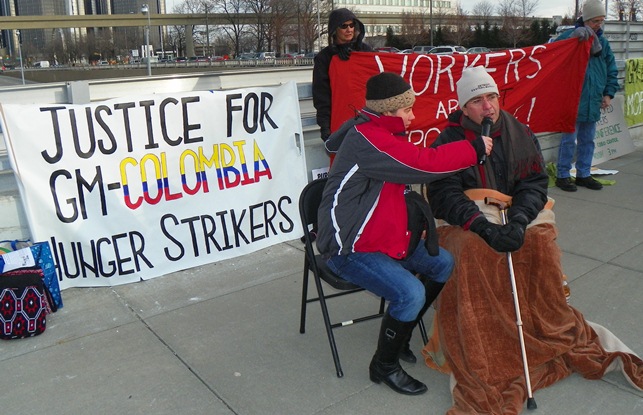
- Jorge Parras (r), GM Colombian worker on hunger strike with 200 others after being fired for being injured on the job, outside the 2013 Detroit Auto Show at Cobo Hall.
200 GM workers from Colombian plant on hunger strike to protest firing of workers injured on job, as elite celebrate at auto show
U.S. autoworkers protest wages, conditions; Detroiters protest poverty and Right to Work law
By Diane Bukowski
January 21, 2013

Statue of Detroit hero Joe Louis, fists at the ready, turns back on wealthy elite attending “Charity” preview of auto show Jan. 18, 2013.
DETROIT – During the 2013 Detroit auto show, the international media, executives from big corporations and banks, politicians with dollar signs in their eyes, and other assorted wealthy white folks in backless evening gowns and shoes on stilts, black tie and tails have flooded downtown Detroit like it was the wealthy country of Monaco.
“We really get the feel that there is even more activity than there has been over the past five or six years,” Michael O’Callaghan, executive vice president and chief operating officer of the [Detroit Convention and Visitors] bureau, told the Detroit News.. “The show will bring somewhere between $300 million, $400 million to southeast Michigan. Those dollars are gigantic, especially in January. . . . At Metro Detroit hotels, the increased revenue over the two-week period is in excess of $33 million.”
The figures do not include the majority of Black and resident-owned businesses from Detroit. The few Black owned-businesses which had franchises inside Cobo Hall, where the auto show was held, lost them after Cobo Hall was regionalized under the administration of then interim Mayor Kenneth Cockrel, Jr.
VOD spotted City Council President Charles Pugh and a friend at the gala “charity” preview Jan. 18, whose attendance was likely 90 percent white, and managed to catch a shot of him on the run. He repeatedly ducked away as VOD tried to photograph him. Not surprising, since the Big Three, along with mortgage companies and privatizers, have been largely responsible for the devastation of Detroit, moving well-paid unionized jobs away from the city to the South and overseas.

City Council President Charles Pugh shows up at Auto Show charity preview. He repeatedly ducked VOD camera afterwards.
Like Pugh and the rest of the Council’s Rogue Six, the daily media has ignored the reality of Detroit, the poorest major city in the country, where 51 percent of Detroit public schools children live below the poverty rate, and the unemployment rate continues to skyrocket.
Like those who refuse to see homeless people on the streets, well-heeled auto show attendees pointedly ignored protests by laid-off and increasingly impoverished auto workers and Detroiters. GM was touted by the daily media as king of the auto show.
A GM worker from Colombia who has been on hunger strike for 55 days because GM fired him and 200 co-workers after they became disabled due to injuries on the job was the focus of the first protest, sponsored by the Autoworkers Caravan, on Jan. 13 and 14. The only media present, other than those from the progressive left , was an Argentinian reporter.
“I have a spinal injury,” Jorge Parras, the single father of a five-year-old daughter, told VOD as he sat on a chair, covered with blankets. Due to his hunger strike, he said, he is experiencing “a lot of headaches, a lot of nausea, pain all over my body, extreme cold, and debilitation.”
“We hope for a prompt solution because our families are going through extremely difficult times,” Parras said. “Our children, our comrades have been evicted from their homes, and are hungry and desperate. This is why we take such drastic measures.”
He thanked everyone for their support and asked all union members and workers to add theirs. Statements have already been issued by workers in Brazil and Germany. Parras has been in the U.S. for five months. Parras attended demonstrations against Right to Work legislation in Lansing in December, and also traveled with a national delegation by bus to protest the School of the Americas, the CIA’s terrorist training center.
Many of the hunger strikers sewed their mouths shut until infection set in, to shame GM. The workers include 200 who have lost their jobs at GM’s Colomotores assembly plant due to work-related injuries. Prior to starting the hunger strike, they set up a tent encampment at the U.S. Embassy. To date, despite mediation, GM only agreed to a financial settlement of $500,000 to 12 workers, and refused to re-hire any workers. The workers refused the settlement and have continued their hunger strike, vowing not to end it until their demands are met.
“Due to poor working conditions, ASOTRECOL (Association of Injured Workers and Ex-Workers of General Motors Colombia), suffer many medical problems including herniated discs, carpal tunnel, tendonitis, chronic ringing in the ears, spinal injuries and cancer,” according to the Autoworkers Caravan newsletter.
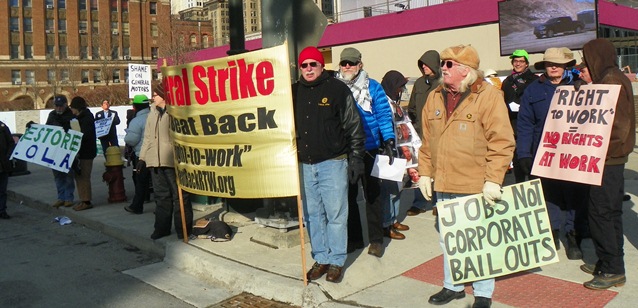
Autoworkers Caravan included members of Beat Back Right to Work, which is mobilizing for a general strike to stop the war on working and poor people.
“ASTRECOL is demanding that GM admit its responsibility, improve health and safety, compensate them for being let go, and rehire them for jobs they can perform. They also want GM to recognize their union. Their encampment, now in its 410th day, aims to pressure the U.S. government, [then] a 20 percent owner – to force GM to honor their demands.”
The Autoworkers Caravan also petitioned United Auto Workers International President Bob King to intervene in the situation, and held a demonstration in front of GM’s headquarters on East Jefferson last August. As a result, UAW VP Joe Ashton and UAW health and safety reps went to Colomotores, to no avail. King was not present at the press conference in front of the Auto Show, but instead went to court to get permission to hold a protest demanding that the UAW be able to organize Nissan plants in the South.
Former UAW Local 160 President Norbin Thompson also spoke at the press conference in support of Parras and his comrades. He said he drank water only for 22 days to support the hunger strike.
“Their struggle resonates because we go through the same things here, but not as severe,” Thompson said. “There is a parallel system of how corporations run here and there. GM has all the capital, the workers have none. We ought to be able to control at least whether out jobs injure us. We are asking for nothing but justice. What is happening in Colombia is migrating here. The workers cannot continue to endure this.”
For updates, and to sign a pledge of support, go to http://www.witnessforpeace.org and http://www.asotrecol.com.
Martha Grevatt, a UAW worker for 25 years who currently works at the GM Warren Stamping Plant, addressed the concerns of her co-workers across the U.S.
“GM went into bankruptcy in 2007 and came out in 2011,” she said. “Workers wanted to make gains as a result, but we have not. We have had no wage increase since 2006; we no longer have cost-of-living allowances; we have an unequal and divisive two-tier wage schedule. Hiring new hourly workers with these concessions has been more advantageous to the companies.”
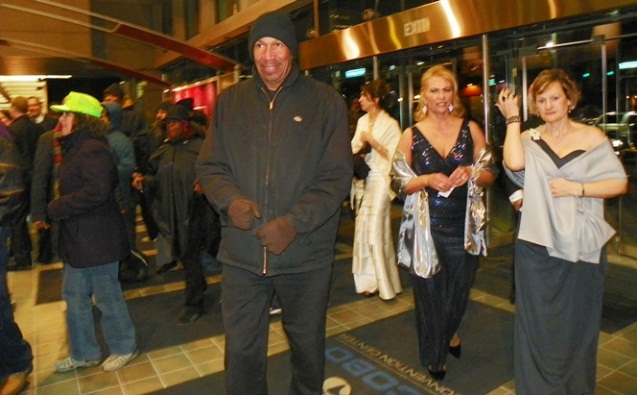
Elite “ladies” appear shocked as workers and poor invade Auto Show with legal oberver (in green hat) Jan. 18, 2013.
She added, “We don’t get overtime on Saturdays; overtime only comes after 40 hours in the week. We have outrageous new work schedules which don’t allow us to choose weekends off, which hurts workers who have been forced to move elsewhere to follow their jobs, because they can’t go home to see their families regularly. Since 1979, 267 auto plants have closed in the U.S., half of them since 2004.”
On Friday, Jan. 18, members of Good Jobs Now and the National Action Network loudly protested outside the auto show as busloads of elegantly dressed people were dropped off at the “charity” preview, to gather around the Cobo Hall statue of Joe Louis, his fists at the ready, drink free champagne and watch luxurious new cars roar up and down the lobby.
Michigan Gov. Rick Snyder and the Republican heads of both houses of the state legislature, responsible for making Michigan a Right to Work (for less) state, along with Detroit mayoral candidate Mike Duggan, were in attendance.
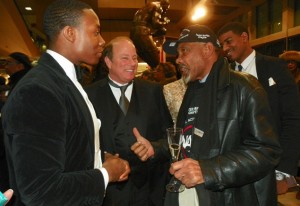
Mike Duggan, who wants to be Detroit’s first white mayor since before Coleman Young, joshes with his lackeys at Auto Show Jan. 18, 2013.
Protesters loudly chanted against Snyder and Right to Work, banging drums and using bullhorns, as attendees scurried inside. Police roped off auto access to Cobo Hall for several blocks, but the protesters took possession of the streets across from Cobo anyway.
They included a large number of Black youth and very informally (and warmly) dressed adults, who decided after enduring the bitter cold for a while to make their presence known inside. They marched across the street to Cobo Hall and invaded the gala as shocked attendees gaped and showed their fright. They mingled with the rich white elite, roving through the lobby without police interference, until Rev. Charles Williams II concluded the protest with a prayer group.


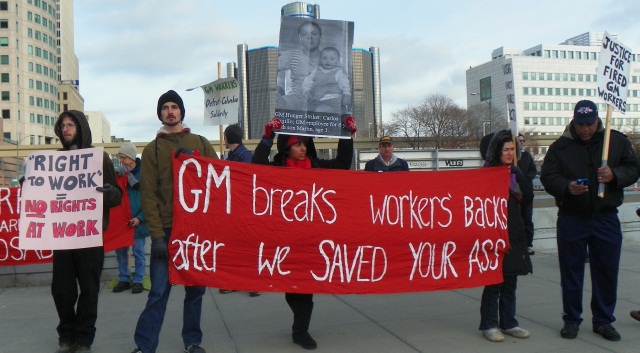
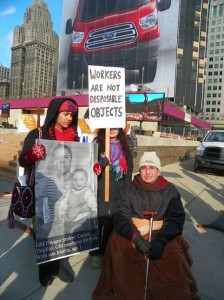
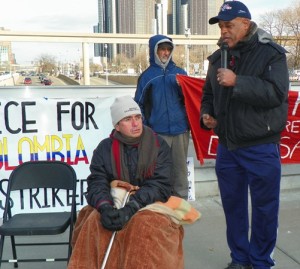
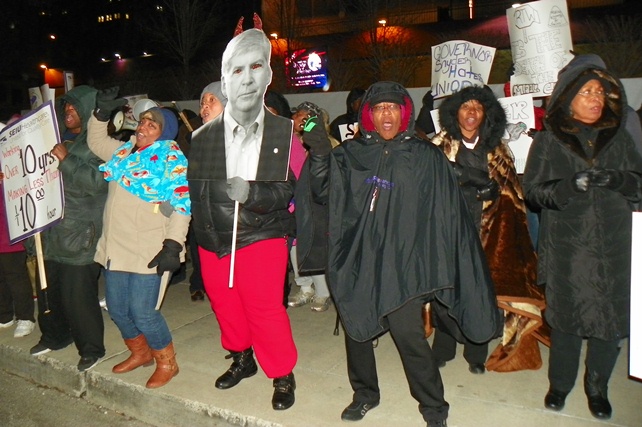
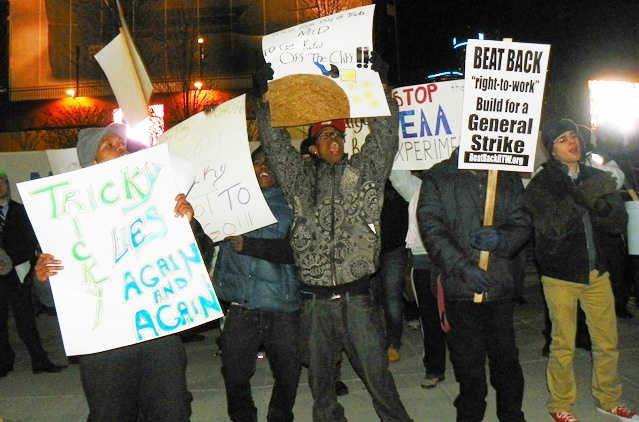

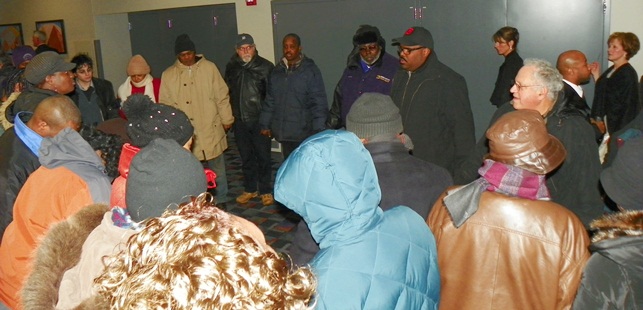




Usually your blog comments are economically sound, and attempt to help Detroit recover economically during this major recession. This particular post glorifies the happenings at the auto show. My belief is that the actions taken at the Detroit Auto Show were counter productive to the economic future growth in Detroit. On the job injuries in Columbia, like other illness in that country, should be resolved by their medical care system. Their other issues such as union recognization, hiring, and job placement for disabled workers are issues that will be resolved between GM management, the workforce, and the government of that country. Protesting a problem in Columbia, while hosting a major gathering that is about USA automobiles, will probably not be effective.
Let’s face it, if Detroit is to recover; it will be because the auto industry can make a sufficient income to return to it’s former size and profitability. Currently that is not. happening. It’s difficult to understand how the auto industry will help Detroit when the citizens protest the major auto show, and the major manufacturer of the industry. Your cause is not helped by the distruptive actions of the crowd in the area, and “crashing” the premier event where the auto executives who were in attendance, will decide when/where to build the next assembly plant.
Instead of protesting GM and the show in general, wouldn’t it be wiser to capture all that energy that was expended in these protests, and work with GM, and all the other companies to have some type of “Detroit” preference, or other enticements to help them hire more Detroit residents? Your post has a great influence, maybe you could work with the transit system to operate special bus routes to the factories. My point is to try to work with the auto industry not condemn it. The better they do – the more people they hire.
a